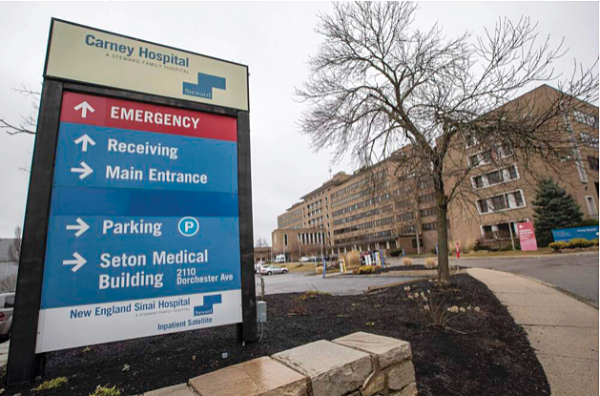April 18, 2024

Carney Hospital on Dorchester Ave.
Recently the Healey administration’s Department of Public Health (DPH) announced it was hosting five invitation-only virtual meetings with hospitals, community health centers, and others in communities where Steward hospitals are located. The meetings, as reported in the Boston Globe, will “focus on meeting the needs of the patients and providers in our communities.” Presumably, the focus will be on continuity of patient care in these communities.
None of the five meetings about Steward will be open to the public or the media. Both the Massachusetts Hospital Association and the Massachusetts League of Community Health Centers appear to be joining DPH in co-sponsoring these virtual community meetings. The Globe reports that the “hosts said they are trying to limit the size of the sessions to encourage frank and open discussions.”
While even virtual meetings can’t accommodate every member of the public, there are technical means to livestream such gatherings so interested and affected residents can at least listen to the proceedings. Given the potentially enormous consequences of the Steward situation on health care across the state, the closed nature of these meetings and the exclusion of media are unfathomable.
Why doesn’t state government trust the public to learn about potentially critical events that will affect where and how they receive healthcare. The decision to exclude the public is a poor policy decision and should be revisited.
It is worth noting that there was another invitation-only committee, chaired by high-level state officials, that met during the early days of Covid around nursing home issues. Those meetings were also not public and the media was excluded.
During the meetings, some non-government attendees called on state officials to make nursing homes a top priority as those officials grappled with the pandemic. Nursing homes were not a top priority early in the pandemic, though that changed once deaths among residents escalated. And because those invitation-only meetings were not public and there were no media reports about them, Massachusetts residents were unaware that such impactful decisions were being made.
While news of the Steward crisis has only become public in the past several months, we know that behind the scenes DPH had been monitoring Steward and trying to obtain financial information for a number of years. Questions remain regarding what state regulators knew about Steward’s situation and whether those regulators had the tools to adequately address mounting concerns. What is clear is that the time for secrecy around Steward has long passed and serves no public benefit.
The public at large in cities and towns around the state that are impacted by the threat of Steward hospital closures or sales have a right to know how officials are planning to address continuity of patient care in their communities. Yet the public – which will ultimately experience the fallout from any hospital closures or sales – is not going to be allowed to witness these state-sponsored proceedings.
There is no reason to shield these meetings from public view. Organizers should reverse their decisions and allow the public and the media access to these proceedings.
Barbara Anthony is a senior fellow in healthcare at Pioneer Institute, a Boston-based public policy think tank.
Topics:


